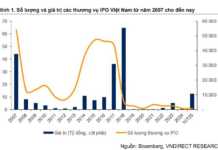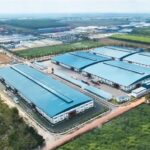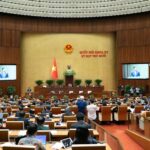
Container handling at Tien Sa Port, Da Nang. (Photo: Tran Le Lam/VNA)
|
Vietnam’s economic reforms and progress over the past 80 years have been described as a
very fierce struggle. From a war-torn country with a heavy subsidy mindset,
Vietnam has risen to the forefront. With decisive reforms and a recent
“reorganization of the country,” Vietnam is seen as having more opportunities than
challenges.
Reforms are important. When it comes to economic reform, Vietnam has made
significant and impressive strides since 1986. Firstly, it empowered the productive
forces, especially farmers and private enterprises. These were foundational steps
that liberated the productive forces.
This second round of reforms differs fundamentally; it’s not just about breaking
barriers and dismantling mechanisms but also about building a foundation for a modern
nation. This requires institutional reform.
The recent streamlining of the apparatus and “reorganization of the country” has
been hailed as a very strong reform.
Professor Vu Minh Khuong from the Lee Kuan Yew School of Public Policy shared,
“The two-level government is truly a strategic turning point and a major reform. I
also want to be part of such endeavors to study how this can be a significant reform,
potentially offering valuable lessons for the developing world. How can we ensure that
the grassroots level truly cares about the people, solves all the equations, harnesses
artificial intelligence (AI), and receives wholehearted support from the central and
provincial levels?”
“This is indeed a very challenging equation, but if Vietnam can solve it within the
next 3-6 months, including the physical infrastructure, legal procedures, and
people, we can definitely succeed. It’s clear that we are undergoing a profound and
comprehensive qualitative transformation, presenting more opportunities than
challenges,” he added.
Vietnam’s lesson is that economic development enhances its position, voice, and
partnerships. In the post-war context and a highly competitive international
environment, Vietnam has been left behind for too long. However, Vietnam has played
by the rules and moved forward by creating comparative advantages.
Professor Bilveer Singh, Deputy Head of the Department of Political Science at the
National University of Singapore, analyzed, “Historically, Vietnam’s comparative
advantage lay in peace, cheap labor, a diligent and skilled population. But that’s
not enough anymore, as the world has become more competitive. Look at the tariffs
imposed by US President Donald Trump, the economic war between the US and China, and
the competitiveness within ASEAN.”
“If Vietnam can produce a T-shirt at a cost of X, Bangladesh can do it cheaper.
Thus, the Vietnamese government’s streamlining of the entire two-level government
structure, reducing the number of ministries, making it more efficient, and even at
the provincial level, cutting 50% of administrative units, will reduce red tape,
attract foreign investment, and ultimately ensure sustainable development,” he added.
Trust is the most important. Today’s generation can be proud of what their
forefathers have achieved. However, development cannot rely solely on pride.
Commenting on Vietnam’s “Quadruple Pillar Resolutions,” Professor Bilveer Singh
stated that these are new technical skills to achieve the goal of advancement.
“Vietnam needs to innovate to remain competitive; it’s no longer just about cheap
labor. It’s about adding value to society, development, investment, law, and
international cooperation,” he said.
However, to achieve this, Professor Bilveer Singh emphasized the need for a correct
understanding of the reasons and goals of reform and advancement. Secondly, it
requires a very strong political will, as the two-level government is not a new
concept.
“Vietnam already has the structure, mindset, and the hearts of the people after the
war. Now, in this era of peace, it will be easier. But don’t become complacent. So, I
think the most important thing for Vietnam, its leaders, and its people to know is to
be aware of the difficulties ahead. Just because you’ve done well doesn’t mean you’ll
continue to do well. You need to understand the new challenges,” he added.
In this era of advancement, the private sector plays and will continue to play a
crucial role in Vietnam’s journey to becoming a developed nation. Progress in urban
development, iron and steel production, automobile manufacturing, and decisive
reforms are supporting the private sector’s strength.
However, according to Professor Vu Minh Khuong, some core issues need attention:
“There must be a transparent market mechanism with a high level of supportive and
creative state involvement. The key to private sector development is still正当
rewards, increasing the trust of businesses and people, and not favoring one group
at the expense of another.”
Professor Vu Minh Khuong asserted, “I just want to emphasize the need for utmost
transparency, fairness, and national strength rather than policy lobbying, which can
cause great harm. The most sacred thing is trust, and I want to emphasize that in all
of Vietnam’s reform efforts, supporting the private sector, trust is the most
important.”
According to analysts, reforms like Vietnam’s are not new, as many Asian countries
such as Singapore, Malaysia, and Indonesia have done so. What Vietnam needs to do now
is learn from its neighbors, avoid mistakes, embrace the good, and move forward.
Do Van
– 08:47 31/08/2025
Nurturing an Environment to Foster Private Enterprise Growth
Resolution 68-NQ/TW was enacted with the aspiration to serve as a catalyst for the private sector’s robust quantitative and qualitative growth. However, to materialize this vision, an “incubation” mechanism is imperative to nurture a multitude of high-caliber private enterprises that can spearhead the development of the business community.
“IR is no longer about ‘number-crunching’ but about ‘story-shaping’.”
In the world of capital markets, information is the raw material, but trust is the ultimate product. Investor Relations (IR) in Vietnam is entering a new era, where businesses are not just providing data but crafting experiences for investors.
Resolution 68: Transforming Perceptions and Mindsets About the Private Sector
“Professor Dang Viet Anh highlights the ambitious goals set by Resolution 68, which envisions a significant boost in private enterprises in Vietnam by 2030. The resolution aims for a substantial increase, targeting at least 1 million additional private businesses in the country by the end of the decade.”
“From ‘Messenger’ to ‘Strategic Companion’”
Over the past decade, the role of Investor Relations (IR) in listed companies has undergone a significant evolution. Once considered merely a conduit for information, a logistical arm of public relations or corporate secretarial function, IR has now become integral to strategic planning, not just for the company but also in meeting the expectations and evaluations of institutional investors.
Unleashing Private Sector Growth: Unlocking Long-Term Capital from Domestic Sources
Resolution 68-NQ/TW has set forth a number of breakthrough requirements to develop the private economy, with one of its key focuses being to enhance long-term capital provision for businesses.













































